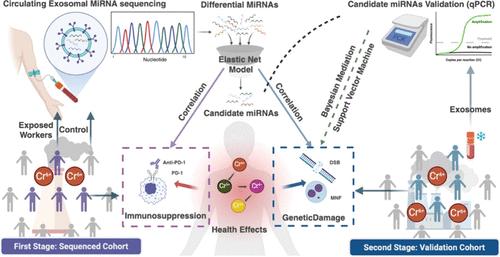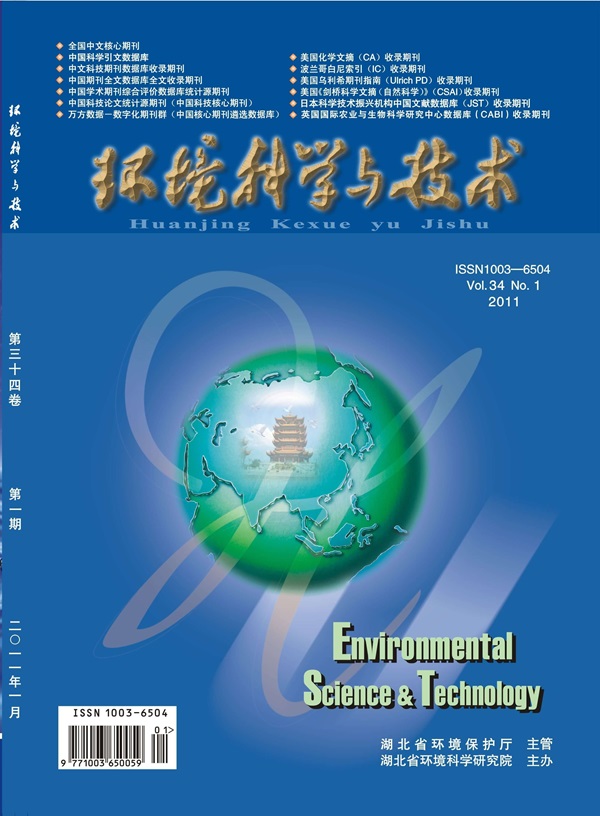外泌体 miRNAs 是六价铬诱导的遗传毒性和免疫毒性的参与者:一项两阶段人群研究
IF 10.8
1区 环境科学与生态学
Q1 ENGINEERING, ENVIRONMENTAL
引用次数: 0
摘要
基因毒性和免疫抑制特性是六价铬[Cr(VI)]致癌特征的核心,循环外泌体miRNA的失调可能充当致癌基因或肿瘤抑制因子,或通过免疫调节参与重金属的致癌过程。在这项分两个阶段进行的流行病学调查中,我们首次揭示了暴露于六价铬的个体的外泌体miRNA干扰,以及它们与遗传损伤生物标志物(循环淋巴细胞中的γ-H2AX阳性和尿液中的8-OHdG水平)和免疫指标(免疫抑制性PD-1表达)之间的显著相关性,并在外部队列中进行了验证。利用支持向量机模型,我们发现外泌体miRNA,尤其是miR-4467、miR-345-5p、miR-144-3p和miR-206,在高精度地划分人群中的遗传损伤层方面表现出卓越的能力,而这些miRNA预测的靶基因进一步阐明了它们与效应生物标志物之间错综复杂的调控相互作用。此外,利用贝叶斯中介框架,我们观察到 miR-4467 在铬暴露与尿 8-OHdG 水平上升之间的中介功能(中介效应:0.47,P < 0.05)。尽管我们的研究结果表明,细胞外 miRNA 与免疫抑制生物标志物之间存在联系,但这种联系并未在外部队列中得到验证,这可能是由于人群的异质性造成的。总之,这项研究加深了我们对细胞外 miRNA 在表观遗传学上协调六价铬对健康危害的理解,揭示了它们的表达特征及其与六价铬诱导的遗传和免疫学干扰之间错综复杂的相互作用,从而为重金属的毒性途径提供了新的视角。本文章由计算机程序翻译,如有差异,请以英文原文为准。

Exosomal miRNAs as Participators of Hexavalent Chromium-Induced Genotoxicity and Immunotoxicity: A Two-Stage Population Study
Genotoxic and immunosuppressive characteristics are central to the carcinogenic profile of hexavalent chromium [Cr(VI)], with dysregulation of circulating exosomal miRNA potentially acting as oncogenes or tumor suppressors or participating in the carcinogenic landscape of heavy metals through immunomodulation. In this two-stage epidemiological investigation, we unveiled for the first time the perturbations of exosomal miRNAs among individuals exposed to Cr(VI), alongside their significant correlations with biomarkers of genetic injury (γ-H2AX positivity in circulating lymphocytes and the urinary 8-OHdG levels) and immunological indicators (immunosuppressive PD-1 expression), which was supported by validation in an external cohort. Employing a support vector machine model, we discerned that exosomal miRNAs, particularly miR-4467, miR-345-5p, miR-144-3p, and miR-206, exhibited a remarkable capacity to delineate the genetic damage stratum within the population with high precision, and the target genes predicted of these miRNAs further elucidated their intricate regulatory interplay with the effector biomarkers. Additionally, employing a Bayesian mediation framework, we observed the intermediary function of miR-4467 in the nexus between chromium exposure and the escalation of urinary 8-OHdG levels (mediation effect: 0.47, P < 0.05). Although our findings suggested a link between extracellular miRNAs and immunosuppressive biomarkers, this association did not achieve validation in the external cohort, possibly due to population heterogeneity. Collectively, this study advanced our understanding of the epigenetic orchestration of health hazards of Cr(VI) by exosomal miRNAs, shedding light on their expression signatures and their intricate interplay with Cr(VI)-induced genetic and immunological perturbations, thus providing novel perspectives on the toxic pathways of heavy metals.
求助全文
通过发布文献求助,成功后即可免费获取论文全文。
去求助
来源期刊

环境科学与技术
环境科学-工程:环境
CiteScore
17.50
自引率
9.60%
发文量
12359
审稿时长
2.8 months
期刊介绍:
Environmental Science & Technology (ES&T) is a co-sponsored academic and technical magazine by the Hubei Provincial Environmental Protection Bureau and the Hubei Provincial Academy of Environmental Sciences.
Environmental Science & Technology (ES&T) holds the status of Chinese core journals, scientific papers source journals of China, Chinese Science Citation Database source journals, and Chinese Academic Journal Comprehensive Evaluation Database source journals. This publication focuses on the academic field of environmental protection, featuring articles related to environmental protection and technical advancements.
 求助内容:
求助内容: 应助结果提醒方式:
应助结果提醒方式:


